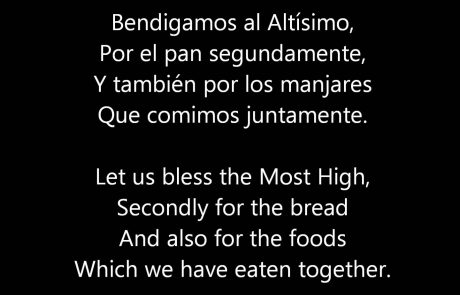Sephardic Custom
Words Of Prayer and Intention: A Sustainability Motzi
This poetic blessing over the bread brings one’s intentions toward all of the people, powers, and systems that allowed for the bread to come into existence. The prayer finishes with an
Fortuna Performs “Bendigamos” Sephardic Grace After Meals Hymn
This video clip presents Brazilian singer, songwriter and actress, Fortuna, performing “Bendigamos Al Altísimo,” a Spanish hymn traditionally sung after meals by Jews of Spanish, Portuguese and Turkish descent. Fortuna, a Sephardic
Mizrahi Grace After Meals (Hebrew Audio & Text)
This post presents the Hebrew text and an audio recording of the full weekday Grace After Meals, according to the custom and pronunciation of Edot HaMizrach practiced by many Sephardic and
A Musical Version of Nusach Ari Grace After Meals
This almost 12 minute long audio recording presents the Nusach Ari version of the Grace After Meals sung slowly by Rabbi Sasson Natan to an upbeat, joyful tune with musical
Bendigamos Al Altísimo: A Spanish Grace After Meals Hymn (Audio & Text)
Bendigamos (literally “Let Us Bless”) is a Spanish hymn traditionally sung after meals by Jews of Spanish, Portuguese and Turkish descent (in addition to the traditional Grace After Meals.) This post includes
Sephardic/Mizrahi Custom: Shalom Aleichem
This video demonstrates the Sephardic/Mizrahi tradition for Shalom Aleichem, which has five stanzas, instead of four, as is the common Ashkenazi custom. The additional verse, “B’shiv-t’chem L’shalom,” translated as “May your rest
Maimonides’ Ten Levels of Angels
In this article, Whitney Hopler elaborates on the ten different types of angels found in Jewish literature according to Maimonides (Rabbi Moses ben Maimon, 1135-1204), the great medieval Spanish philosopher. Although angels
How to Separate Challah: Sephardic & Ashkenazi Customs
This excerpt from “The Secret of Challah” by Shira Wiener & Ayelet Yifrach provides clear and concise directions for both Ashkenazim and Sepharadim on how to perform the mitzvah (commandment) of Hafrashat
Rabbi Ovadia Yosef: Women’s Obligation in HaMotzi and Shabbat Meals
This article, written by Halacha Yomit (Daily Laws), describes the women’s obligation to participate in the blessing over the bread and the three meals on Shabbat according to Orthodox tradition. Ideal









